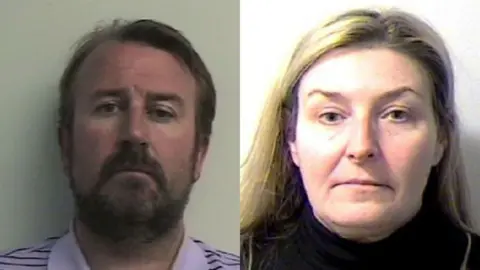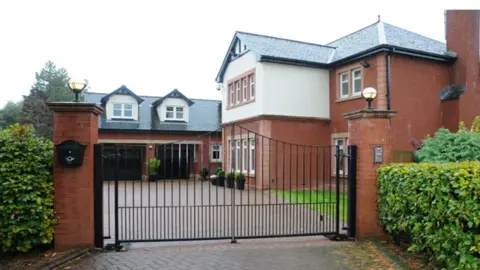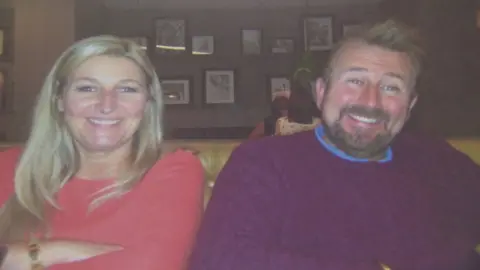Couple jailed after UK's longest criminal trial
 Police
PoliceA husband and wife have been jailed after a con which saw vulnerable people sign over ownership of their homes.
Edwin McLaren and his wife Lorraine were convicted of property fraud last month after what is believed to be the longest trial in UK criminal history.
Mr McLaren, who was said to be the brains behind the scheme, was convicted of 29 charges and jailed for 11 years.
His wife Lorraine was convicted of two charges and sentenced to two-and-a-half years in prison.
The trial of the couple, from Quarriers Village in Inverclyde, started in September 2015 at the High Court in Glasgow and heard 320 days of evidence.
Sentencing Edwin McLaren, judge Lord Stewart told him: "Vulnerable individuals were taken advantage of. The evidence showed breathtaking dishonesty in every aspect of your enterprise by you and those acting on your instructions.
"The jury found you to be an outright liar. "
The judge said father-of-two McLaren had targeted householders in financial difficulty and by offering solutions to their problems had induced them to unknowingly sign over the ownership of their homes.
He said McLaren's motivation was to obtain funds to finance an "affluent lifestyle".
The total value of the fraud was £1.6m.
Lord Stewart told Lorraine McLaren: "Your husband was the prime force and I accept that. You have a strong personality with a mind of your own.
"The jury found you to be an outright liar."
Throughout Scotland
The frauds, which took place between April 2008 and November 2012, came to light when a woman in Fife claimed she had not been paid the full amount that she was promised for the sale of her house in Cowdenbeath.
During a two-year police inquiry, 48 properties were investigated under a property fraud scheme where the owner's title deeds were transferred without their knowledge.
Twenty-nine cases made it on to the indictment in court, involving properties throughout Scotland.
The case was described by police "one of the largest, most complicated property fraud investigations ever carried out in Scotland".
The operation was run by 52-year-old Edwin McLaren who targeted people under financial pressure, often after placing adverts in newspapers for two companies - Property Solutions and Homesale Solutions.

McLaren, who would often use a false name, would tell his victims he would sort out their financial difficulties, usually in the form of a loan or leaseback agreement.
They thought they were releasing equity from their homes but McLaren had them sign paperwork which transferred full ownership of their property.
Police said his clients were usually completely unaware they had signed away their houses until they were approached by officers.
The property was never transferred to him - instead he used family members and friends.
He also raised mortgages against the properties.


Some witnesses said they were not only in financial difficulty but also unwell or bereaved.
In the case of one couple McLaren turned up at the Beatson Cancer Centre in Glasgow to get a document signed.
The homeowner said he was so weakened by his cancer treatment he did not even know what the document was.
It turned out that he and his wife were signing over their house.
Lorraine McLaren told the court it was her husband who ran that side of their property business and that she signed the documents when he asked her to.
No lawyers who were involved in the transactions were prosecuted as they were used as witnesses in the trial.

Longest trial in UK criminal history
The details of the trial of Edwin and Lorraine McLaren are remarkable.
Over the course of 20 months, the jury was reduced from the original 15 for a Scottish criminal trial to 12, the lowest number it can operate on.
There were concerns that if they had lost another juror the case would have collapsed.
The jurors had to listen to 320 days of evidence, sparking critics to question whether juries should be used in complex fraud cases.
The cost of the trial is thought to have been about £7.5m, with more than £2.4m in legal aid paid for defence lawyers.
During the trial the court had to halt for three weeks after one juror got married, while others were off sick or took holidays.
It was also the first time in Scotland that evidence was led from the house of a witness who was too ill to attend court.
The house was set up as a court with all the legal trappings needed for her to give evidence.
In an unusual step, judge Lord Stewart used a computer slideshow presentation to sum up the case for the jury.
The judge officially retired from the bench on his 70th birthday in December 2016 but was able to continue hearing the case under the provisions of the Judicial Pensions and Retirement Act 1993.
